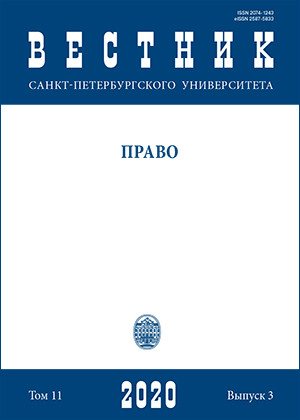Restrictions on the right to distribute information on the Internet in light of countering the spread of drugs
DOI:
https://doi.org/10.21638/spbu14.2020.302Abstract
Digitalization has led not only to the expansion of the sphere of people’s communication space, but also to more effective illegal acts with substances that are prohibited from being circulated, in particular, narcotic drugs and psychotropic substances, their analogues, or precursors (hereinafter abbreviated as drugs). Today, drug distribution has “gone online”, and the state is forced to restrict the right to freedom of information in order to make such distribution unsafe for drug traffickers. The article assesses the state of crimes committed in this area and analyzes the problem of the additional criminalization of actions that contribute to the spread of drugs through the use of the Internet. It is emphasized that the Internet’s capabilities contribute to drug trafficking to varying degrees, and specific actions are highlighted that increase drug use among the population. The authors come to the conclusion that the use of the Internet in drug crimes requires stricter responsibility not only for the sale of drugs, but also in relation to persuasion, both by involving a particular person in their consumption and by promoting drug use. Attention is paid to the psychological mechanism of drug dependence, the study of which is important for the prevention of drug related crimes. The conclusion is substantiated that the tendency to use drugs through the use of the Internet generates a combination of addictive behavior, in which there is interaction and complementarity in the quality of the impact on the person from the Internet and drugs. As a result, “Internet addiction” develops as a relatively new area of addiction. This explains why the first victims of the new addiction are teenagers who are firmly “stuck in the Internet web”, and how the negative impact of this web can be reduced.
Keywords:
Internet, digitalization, foreign experience, Internet addiction, drug propaganda, propensity to use drugs
Downloads
References
Downloads
Published
How to Cite
Issue
Section
License
Articles of "Vestnik of Saint Petersburg University. Law" are open access distributed under the terms of the License Agreement with Saint Petersburg State University, which permits to the authors unrestricted distribution and self-archiving free of charge.






